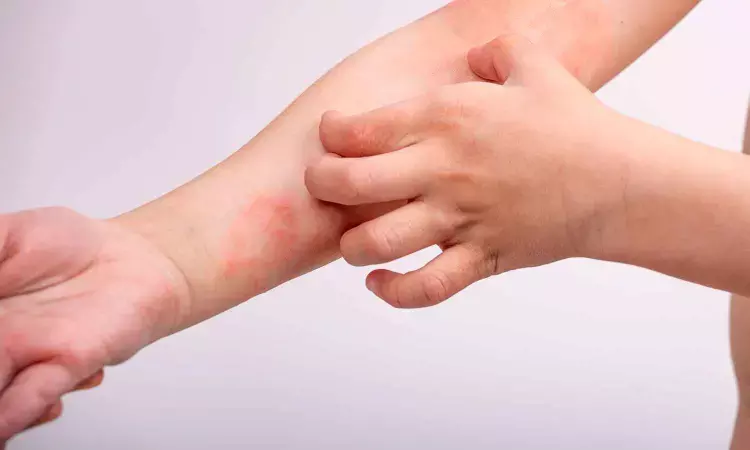- Home
- Medical news & Guidelines
- Anesthesiology
- Cardiology and CTVS
- Critical Care
- Dentistry
- Dermatology
- Diabetes and Endocrinology
- ENT
- Gastroenterology
- Medicine
- Nephrology
- Neurology
- Obstretics-Gynaecology
- Oncology
- Ophthalmology
- Orthopaedics
- Pediatrics-Neonatology
- Psychiatry
- Pulmonology
- Radiology
- Surgery
- Urology
- Laboratory Medicine
- Diet
- Nursing
- Paramedical
- Physiotherapy
- Health news
- Fact Check
- Bone Health Fact Check
- Brain Health Fact Check
- Cancer Related Fact Check
- Child Care Fact Check
- Dental and oral health fact check
- Diabetes and metabolic health fact check
- Diet and Nutrition Fact Check
- Eye and ENT Care Fact Check
- Fitness fact check
- Gut health fact check
- Heart health fact check
- Kidney health fact check
- Medical education fact check
- Men's health fact check
- Respiratory fact check
- Skin and hair care fact check
- Vaccine and Immunization fact check
- Women's health fact check
- AYUSH
- State News
- Andaman and Nicobar Islands
- Andhra Pradesh
- Arunachal Pradesh
- Assam
- Bihar
- Chandigarh
- Chattisgarh
- Dadra and Nagar Haveli
- Daman and Diu
- Delhi
- Goa
- Gujarat
- Haryana
- Himachal Pradesh
- Jammu & Kashmir
- Jharkhand
- Karnataka
- Kerala
- Ladakh
- Lakshadweep
- Madhya Pradesh
- Maharashtra
- Manipur
- Meghalaya
- Mizoram
- Nagaland
- Odisha
- Puducherry
- Punjab
- Rajasthan
- Sikkim
- Tamil Nadu
- Telangana
- Tripura
- Uttar Pradesh
- Uttrakhand
- West Bengal
- Medical Education
- Industry
Atopic dermatitis patients on Janus kinase inhibitors have increased risk of infection compared to biologics: Study

A new study published in the Journal of European Academy of Dermatology and Venerology showed that compared to patients on biologics, the patients with moderate-to-severe atopic dermatitis on Janus kinase inhibitors (JAKi) were more susceptible to infections.
Biologics dupilumab (anti-IL-4/13) and tralokinumab (anti-IL-13) and Janus kinase (JAK) inhibitors abrocitinib (JAK1 selective), baricitinib (JAK1/2 selective), and upadacitinib (JAK1 selective) are the two primary types of new, targeted systemic treatments available for moderate-to-severe AD. These treatments have diverse infection risk profiles because of their different mechanisms of action. Biologics may have a more favorable profile, whereas JAK inhibitors (JAKi) may be more risky due to their wider immunosuppressive effects. By comparing the impact of presently available biologic and JAKi therapies on overall infection risk in AD patients in a daily practice scenario, this research seeks to close this gap.
From October 2017 to July 2024, this prospective, multicenter research assessed treatment-emergent infections in patients (age ≥12 years) taking biologics or JAKi from the BioDay registry. For each therapy, crude incidence rates were computed per 100 patient-years (PY). Using subgroup and sensitivity analyses in bio-/JAKi-naïve patients, hazard ratios (HR) for the rate of infections were estimated using Cox regression for recurrent occurrences, adjusted for possible confounders.
A total of 1793 individuals with 794 infections were included (4044.1 PY; 1886 biologic therapy sessions (TEs); 480 JAKi). When compared to biologics (13.6–22.0), JAKi had greater infection rates (58.4–65.5/100 PY), particularly for herpes infections (n = 195, 24.6%; JAKi 13.6–19.8 vs. biologicals 3.0–3.6).
In comparison to dupilumab, Cox regression showed higher rates with JAKi and a marginal rise with tralokinumab. These findings were validated by sensitivity analysis, with the exception of tralokinumab. Although absolute numbers were modest and relationships were not always significant, JAKi had greater rates of serious infections than dupilumab. An independent factor linked to infection was shown to be the history of infection, primarily fungal or viral skin infections.
Overall, in adults and adolescents with moderate-to-severe AD, this real-world investigation found a distinct infection risk profile linked to biologic and JAKi therapy. JAKi had a higher risk of extracutaneous and total skin infections than biologics.
Source:
van der Gang, L. F., Atash, K., Zuithoff, N. P. A., Haeck, I., Boesjes, C. M., Bacoş-Cosma, O. I., Loman, L., Kamsteeg, M., Stadhouders-Keet, S., Oosting, A. J., van Lynden-van Nes, A. M. T., Politiek, K., Gostynksi, A., Berntsen-Zandbergen, L., Christoffers, W. A., Flinterman, A., Touwslager, W. R. H., Velstra, B., Stewart, S. M., … de Bruin-Weller, M. S. (2025). Infection risk in atopic dermatitis patients treated with biologics and JAK inhibitors: BioDay results. Journal of the European Academy of Dermatology and Venereology: JEADV. https://doi.org/10.1111/jdv.20674
Neuroscience Masters graduate
Jacinthlyn Sylvia, a Neuroscience Master's graduate from Chennai has worked extensively in deciphering the neurobiology of cognition and motor control in aging. She also has spread-out exposure to Neurosurgery from her Bachelor’s. She is currently involved in active Neuro-Oncology research. She is an upcoming neuroscientist with a fiery passion for writing. Her news cover at Medical Dialogues feature recent discoveries and updates from the healthcare and biomedical research fields. She can be reached at editorial@medicaldialogues.in
Dr Kamal Kant Kohli-MBBS, DTCD- a chest specialist with more than 30 years of practice and a flair for writing clinical articles, Dr Kamal Kant Kohli joined Medical Dialogues as a Chief Editor of Medical News. Besides writing articles, as an editor, he proofreads and verifies all the medical content published on Medical Dialogues including those coming from journals, studies,medical conferences,guidelines etc. Email: drkohli@medicaldialogues.in. Contact no. 011-43720751


